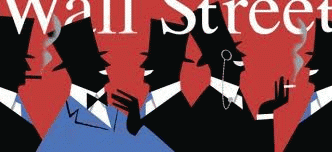Take a look at these two sentences:
"(I)f losses from the 2007-2009 crisis were to reach similar levels (as they did in previous recessions) ... losses could exceed $13 trillion." Government Accountability Office"You would think that any regulation that could affect a major part of the economy and cost industry and/or consumers millions of dollars to comply with would be based on rigorous and consistent economic analysis." David C. Johns, Heritage Foundation
In the face of trillion-dollar losses, Wall Street's conservative spokespeople sound like Dr. Evil presenting his demands to world leaders: I will destroy the planet unless you give me ... one million dollars.
The Price of Greed
The other day the GAO released a report on the costs of the 2008 financial crisis and the recession which followed -- which is still going on for millions of Americans. The report confirmed and even increased previous estimates of the crisis' cost, concluding that losses in American output could reach $13 trillion.
The report did something else that was important and admirable, too: It considered the human cost of the recession, noting that "real GDP" -- the most commonly used economic measure in situations like these -- "is an imperfect proxy of overall social welfare."
That's especially true today: While overall statistics show that our country is in a recovery, the top 1 percent in U.S. income captured 121 percent of the gains, while everyone else has actually lost ground since then. Once that's considered, even the GAO's new figures may have understated the costs for the vast majority of Americans.
But, admirably, the GAO report summarizes the painful but now well-known loss of jobs in the present -- and, especially for younger people, the earnings potential that they will suffer for the rest of their lives.
Homeowners Are Financing a Backdoor Bailout
The GAO also estimates the loss in housing value for American families, which it pegs at $9.1 trillion, noting that "national home equity was approximately $3.7 trillion less than total home mortgage debt."
What they're describing is nearly $4 trillion dollars in money that Americans owe to their banks for real estate value that no longer exists. They base that number on December 2011 figures, and it will have changed by now -- both because some real estate markets have picked up, and because millions of homeowners have been foreclosed upon. But the figure is still in the $3 trillion range.
That's $3 trillion in debt that homeowners took because the banks a) systematically drove up the costs of housing by lowering underwriting standards and creating a boom in mortgage-backed securities, b) knowingly bilked investors by selling them lousy risks (which the so-called "credit rating agencies" labeled "AAA"), and then c) accepted a government bailout when the inevitable collapse followed.
And in yet another enormous favor to the banks, they continue to carry this worthless value on their books. They collect payments on it, or use it to foreclose on families.
Designed by a Committee
The GAO report's conclusion is all the more astonishing, since it was produced by a committee which included a number of relevant "stakeholders": A major institutional investor (from the California Public Employees' Retirement System); bankers, financiers and hedge funders from institutions like Goldman Sachs, Deutschebank, and Black Rock; the pro-99 percent Americans for Financial Reform; along with Paul Volcker, Sheila Bair and other subject matter experts.
(Note: You can view every article as one long page if you sign up as an Advocate Member, or higher).






